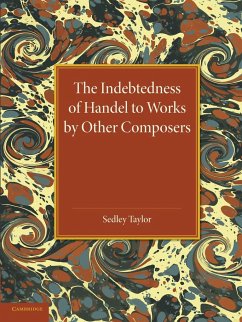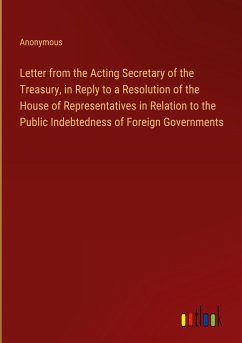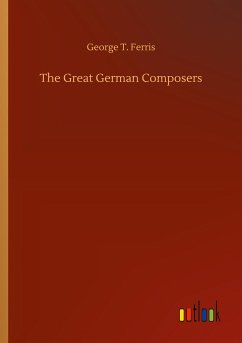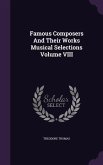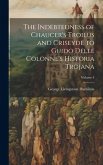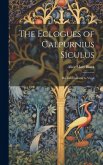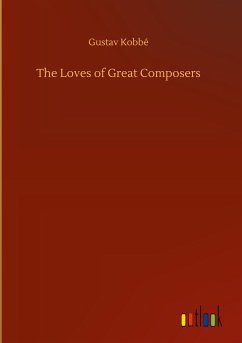- Broschiertes Buch
- Merkliste
- Auf die Merkliste
- Bewerten Bewerten
- Teilen
- Produkt teilen
- Produkterinnerung
- Produkterinnerung
This book, originally published in 1906, examines the influence on Handel by a number of lesser-known composers.
Andere Kunden interessierten sich auch für
![Letter from the Acting Secretary of the Treasury, in Reply to a Resolution of the House of Representatives in Relation to the Public Indebtedness of Foreign Governments Letter from the Acting Secretary of the Treasury, in Reply to a Resolution of the House of Representatives in Relation to the Public Indebtedness of Foreign Governments]() AnonymousLetter from the Acting Secretary of the Treasury, in Reply to a Resolution of the House of Representatives in Relation to the Public Indebtedness of Foreign Governments34,90 €
AnonymousLetter from the Acting Secretary of the Treasury, in Reply to a Resolution of the House of Representatives in Relation to the Public Indebtedness of Foreign Governments34,90 €![The Great German Composers The Great German Composers]() George Titus FerrisThe Great German Composers69,90 €
George Titus FerrisThe Great German Composers69,90 €![The Great German Composers The Great German Composers]() George T. FerrisThe Great German Composers19,90 €
George T. FerrisThe Great German Composers19,90 €![Famous Composers And Their Works Musical Selections Volume VIII Famous Composers And Their Works Musical Selections Volume VIII]() Theodore ThomasFamous Composers And Their Works Musical Selections Volume VIII37,99 €
Theodore ThomasFamous Composers And Their Works Musical Selections Volume VIII37,99 €![The Indebtedness of Chaucer's Troilus and Criseyde to Guido Delle Colonne's Historia Trojana; Volume 4 The Indebtedness of Chaucer's Troilus and Criseyde to Guido Delle Colonne's Historia Trojana; Volume 4]() George Livingstone HamiltonThe Indebtedness of Chaucer's Troilus and Criseyde to Guido Delle Colonne's Historia Trojana; Volume 436,99 €
George Livingstone HamiltonThe Indebtedness of Chaucer's Troilus and Criseyde to Guido Delle Colonne's Historia Trojana; Volume 436,99 €![The Eclogues of Calpurnius Siculus: His Indebtedness to Virgil The Eclogues of Calpurnius Siculus: His Indebtedness to Virgil]() Alice Mary BlackThe Eclogues of Calpurnius Siculus: His Indebtedness to Virgil35,99 €
Alice Mary BlackThe Eclogues of Calpurnius Siculus: His Indebtedness to Virgil35,99 €![The Loves of Great Composers The Loves of Great Composers]() Gustav KobbéThe Loves of Great Composers34,90 €
Gustav KobbéThe Loves of Great Composers34,90 €-
-
-
This book, originally published in 1906, examines the influence on Handel by a number of lesser-known composers.
Hinweis: Dieser Artikel kann nur an eine deutsche Lieferadresse ausgeliefert werden.
Hinweis: Dieser Artikel kann nur an eine deutsche Lieferadresse ausgeliefert werden.
Produktdetails
- Produktdetails
- Verlag: Cambridge University Press
- Seitenzahl: 212
- Erscheinungstermin: 10. Februar 2014
- Englisch
- Abmessung: 280mm x 210mm x 12mm
- Gewicht: 532g
- ISBN-13: 9781107421455
- ISBN-10: 1107421454
- Artikelnr.: 41247500
- Herstellerkennzeichnung
- Libri GmbH
- Europaallee 1
- 36244 Bad Hersfeld
- gpsr@libri.de
- Verlag: Cambridge University Press
- Seitenzahl: 212
- Erscheinungstermin: 10. Februar 2014
- Englisch
- Abmessung: 280mm x 210mm x 12mm
- Gewicht: 532g
- ISBN-13: 9781107421455
- ISBN-10: 1107421454
- Artikelnr.: 41247500
- Herstellerkennzeichnung
- Libri GmbH
- Europaallee 1
- 36244 Bad Hersfeld
- gpsr@libri.de
Preface; Introduction. Outline of history of opinion as to Handel's
originality; 1. Comparison of passages from works by Handel with extracts
from compositions by Gottlieb, Muffat, and with manuscript copies made
thence by Handel; 2. Comparison of passages from Handel's Jephtha with
extracts from masses by Franz Johann Habermann, and with manuscript copies
made thence by Handel; 3. Comparison of a chorus in Handel's Theodora with
a vocal duet by Giovanni Carlo Maria Clari; 4. Comparison of two choruses
in Handel's Trionfo del Tempo with two choruses in a work by Karl Heinrich
Graun, and with manuscript copies of them made by Handel. Miscellaneous
examples of Handel's use of his work; 5. Handel's use of earlier
compositions of his own. Instances of this in the case of some duets set to
secular Italian words and afterwards developed into several choruses, and
one duet, in Messiah; 6. Character of results attained by Handel when
making use of pre-existing materials. Israel in Egypt affords unique
opportunities for studying these results. Comparison of Part I of that
oratorio with portions of a serenata by Stradella, an organ-piece by Kerl
and four earlier compositions of Handel's own; 7. Comparison of Part II of
Israel in Egypt with a Latin Magnificat, the authorship of which is
disputed, and with a passage from a Latin Te Deum by Urio; 8. Discussion of
the question whether Handel's mode of dealing with compositions by other
Masters was morally justifiable; Appendices: List of works by Handel quoted
from in this volume; List of composers, instances of the use of whose works
by Handel are quoted in this volume; List of examples; Index.
originality; 1. Comparison of passages from works by Handel with extracts
from compositions by Gottlieb, Muffat, and with manuscript copies made
thence by Handel; 2. Comparison of passages from Handel's Jephtha with
extracts from masses by Franz Johann Habermann, and with manuscript copies
made thence by Handel; 3. Comparison of a chorus in Handel's Theodora with
a vocal duet by Giovanni Carlo Maria Clari; 4. Comparison of two choruses
in Handel's Trionfo del Tempo with two choruses in a work by Karl Heinrich
Graun, and with manuscript copies of them made by Handel. Miscellaneous
examples of Handel's use of his work; 5. Handel's use of earlier
compositions of his own. Instances of this in the case of some duets set to
secular Italian words and afterwards developed into several choruses, and
one duet, in Messiah; 6. Character of results attained by Handel when
making use of pre-existing materials. Israel in Egypt affords unique
opportunities for studying these results. Comparison of Part I of that
oratorio with portions of a serenata by Stradella, an organ-piece by Kerl
and four earlier compositions of Handel's own; 7. Comparison of Part II of
Israel in Egypt with a Latin Magnificat, the authorship of which is
disputed, and with a passage from a Latin Te Deum by Urio; 8. Discussion of
the question whether Handel's mode of dealing with compositions by other
Masters was morally justifiable; Appendices: List of works by Handel quoted
from in this volume; List of composers, instances of the use of whose works
by Handel are quoted in this volume; List of examples; Index.
Preface; Introduction. Outline of history of opinion as to Handel's
originality; 1. Comparison of passages from works by Handel with extracts
from compositions by Gottlieb, Muffat, and with manuscript copies made
thence by Handel; 2. Comparison of passages from Handel's Jephtha with
extracts from masses by Franz Johann Habermann, and with manuscript copies
made thence by Handel; 3. Comparison of a chorus in Handel's Theodora with
a vocal duet by Giovanni Carlo Maria Clari; 4. Comparison of two choruses
in Handel's Trionfo del Tempo with two choruses in a work by Karl Heinrich
Graun, and with manuscript copies of them made by Handel. Miscellaneous
examples of Handel's use of his work; 5. Handel's use of earlier
compositions of his own. Instances of this in the case of some duets set to
secular Italian words and afterwards developed into several choruses, and
one duet, in Messiah; 6. Character of results attained by Handel when
making use of pre-existing materials. Israel in Egypt affords unique
opportunities for studying these results. Comparison of Part I of that
oratorio with portions of a serenata by Stradella, an organ-piece by Kerl
and four earlier compositions of Handel's own; 7. Comparison of Part II of
Israel in Egypt with a Latin Magnificat, the authorship of which is
disputed, and with a passage from a Latin Te Deum by Urio; 8. Discussion of
the question whether Handel's mode of dealing with compositions by other
Masters was morally justifiable; Appendices: List of works by Handel quoted
from in this volume; List of composers, instances of the use of whose works
by Handel are quoted in this volume; List of examples; Index.
originality; 1. Comparison of passages from works by Handel with extracts
from compositions by Gottlieb, Muffat, and with manuscript copies made
thence by Handel; 2. Comparison of passages from Handel's Jephtha with
extracts from masses by Franz Johann Habermann, and with manuscript copies
made thence by Handel; 3. Comparison of a chorus in Handel's Theodora with
a vocal duet by Giovanni Carlo Maria Clari; 4. Comparison of two choruses
in Handel's Trionfo del Tempo with two choruses in a work by Karl Heinrich
Graun, and with manuscript copies of them made by Handel. Miscellaneous
examples of Handel's use of his work; 5. Handel's use of earlier
compositions of his own. Instances of this in the case of some duets set to
secular Italian words and afterwards developed into several choruses, and
one duet, in Messiah; 6. Character of results attained by Handel when
making use of pre-existing materials. Israel in Egypt affords unique
opportunities for studying these results. Comparison of Part I of that
oratorio with portions of a serenata by Stradella, an organ-piece by Kerl
and four earlier compositions of Handel's own; 7. Comparison of Part II of
Israel in Egypt with a Latin Magnificat, the authorship of which is
disputed, and with a passage from a Latin Te Deum by Urio; 8. Discussion of
the question whether Handel's mode of dealing with compositions by other
Masters was morally justifiable; Appendices: List of works by Handel quoted
from in this volume; List of composers, instances of the use of whose works
by Handel are quoted in this volume; List of examples; Index.

